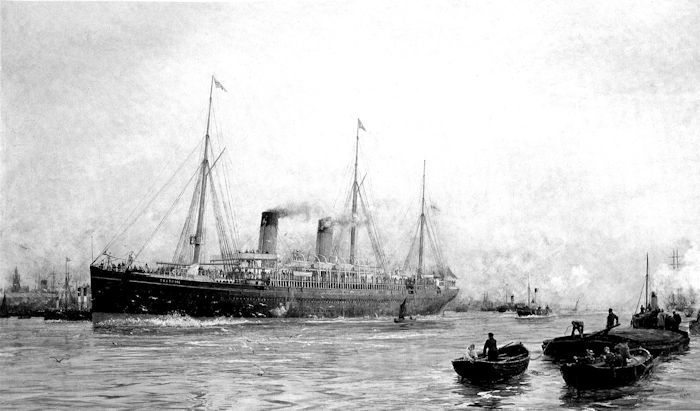
The White Star Liner "Teutonic" Leaving Liverpool on her Maiden Voyage, August, 1889
List of Songs ~ Songs of Mike Kennedy Home Page
Printable Version ~ PDF ~ MP3 Sample ~ Original Poem ~ Notes

The White Star Liner "Teutonic" Leaving Liverpool on her Maiden Voyage, August, 1889
We left the murk of Merseyside, we left the flaring town;
All smouldering red by Spanish Head the stormy sun went down;
We saw the lamp blink out by the Mull o' Galloway,
And in the dead of night to Rathlin's Light a long good-bye did say –
Before the light of morning.
Black deep the night without a star, both sky and sea did fill;
So cautious crept we through the dark, our engines near stood still;
All salt like tears on rope and rail, the sea mist clinging grey . . .
And Rathlin Island close to port, Kintyre to starboard lay –
Before the light of morning.
We heard across the blind black tide the lighthouse boom forlorn;
All night we heard a Glasgow barque blowing the old cow's horn;
And groping slow we passed her by, a bare ship's length away –
"A close thing with that barque," was all I heard the Old Man say –
Before the light of morning.
All houseless stand the unfenced fields that cold and green do roll,
Where the winds do herd the berg and floe that calve around the Pole;
Oh, peace be on the small green fields in a land that's far away,
And on the little farms wherein folks a-sleeping lay –
Before the light of morning.
And, oh, good-bye the narrow seas and the forelands loud with foam!
There's many the turning in the road that brings the sailor home;
Full speed once more our engines throbbed as faint the east grew grey,
And I turned my face to Rathlin Head, and a long good-bye did say –
In the cold grey light of morning.
From Songs and Chanties: 1914-1916, edited by Cicely Fox Smith,
published by Elkin Mathews, London, UK, 1919, pp. 95-97.
We left the murk of Merseyside, we left the flaring town;
All smouldering red by Spanish Head the stormy sun went down;
We saw the lamp blink out and in the Mull o' Galloway,
And at dead of night to Rathlin Light a long good-bye did say –
On a bitter cold night in the morning watch,
A little before the day!
Black deep of night without a star both sky and sea did fill;
So cautious crept we through the dark our engines near stood still;
All salt like tears on rope and rail the sea mist clinging grey . . .
And Rathlin Island close to port, Kintyre to starboard lay –
On a bitter cold night in the morning watch,
A little before the day!
We heard across the blind black tide the lighthouse boom forlorn,
All night we heard a Glasgow barque blowing the old cow's horn;
And groping slow we passed her by a bare ship's length away –
"A near thing with the barque," was all I heard the Old Man say –
On a bitter cold night in the morning watch,
A little before the day!
All houseless stretch the unfenced fields that cold and green do roll
Where winds do herd the berg and floe which calve about the Pole;
Oh, peace be on the small green fields of a land that's far away,
And on the little farms therein where folks a-sleeping lay –
On a bitter cold night in the morning watch,
A little before the day!
And oh, good-bye the narrow seas and forelands loud wi' foam!
There's many a turning in the road that brings the sailor home;
Full speed once more our engines throbbed as faint the east grew grey,
I turned my face to Rathlin Head, a long good-bye to say –
On a bitter cold night in the morning watch,
A little before the day!
The header graphic titled The White Star Liner "Teutonic" Leaving Liverpool on her Maiden Voyage, August, 1889, is painted by William Lionel Wyllie, from The Art of Nautical Illustration, by Michael E. Leek, Quantum Books, London, UK, 2005, p. 143.
"Rathlin Light" is located on Altacarry Head, Rathlin Island, North Channel, Northern Ireland, while "Kintyre" is a peninsula in western Scotland. Rathlin Island is an L-shaped island with the "L" opening to the southwest. The Island therefore has headlands at the southeast point, the northwest point, and where the two legs of the "L" meet to the northeast. There is a lighthouse at each location. A lighthouse is mentioned in the song three times as the ship travels from the Irish Sea through the North Channel and then out into the North Atlantic, each a different lighthouse.